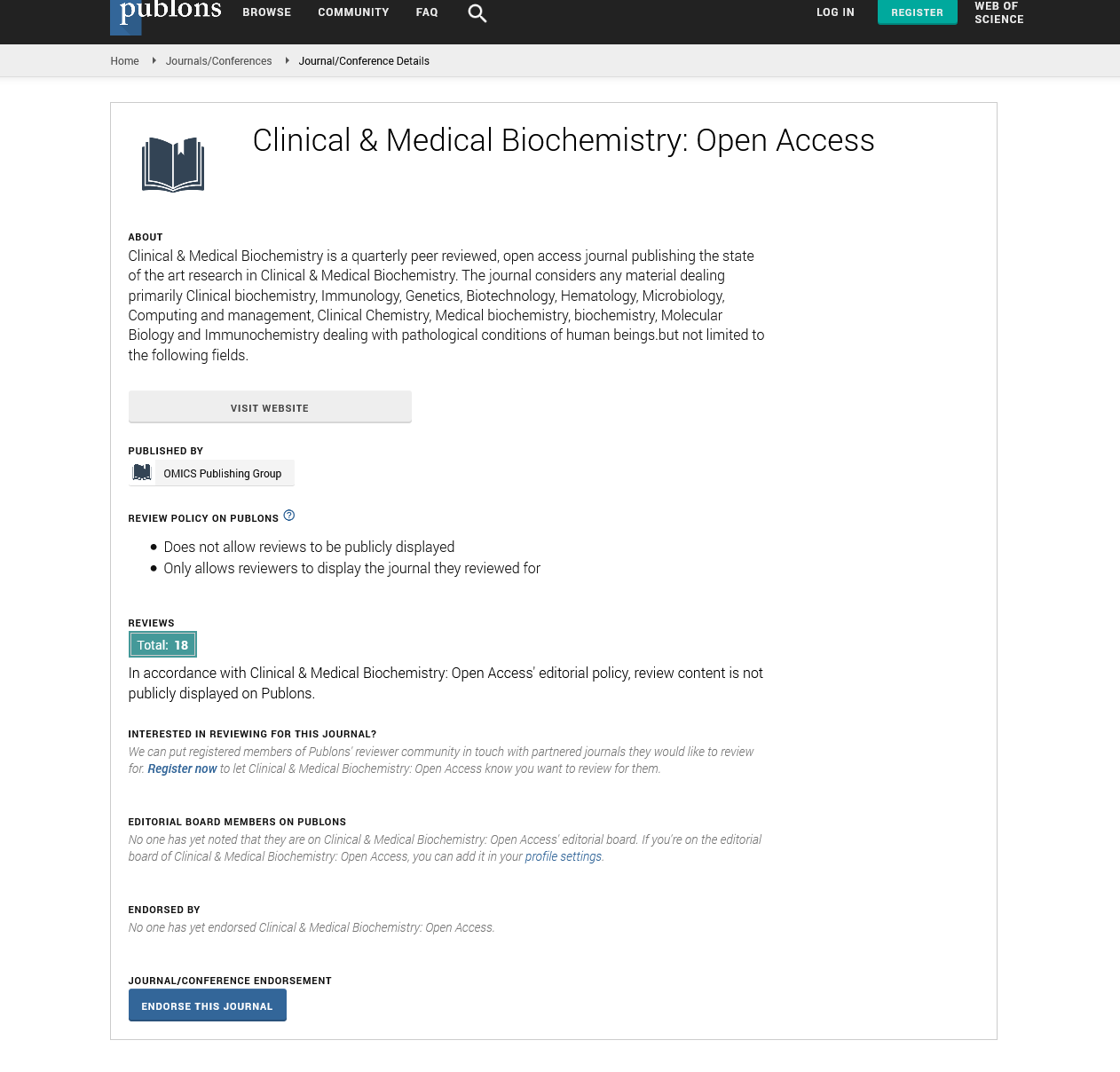Indexed In
- RefSeek
- Directory of Research Journal Indexing (DRJI)
- Hamdard University
- EBSCO A-Z
- OCLC- WorldCat
- Scholarsteer
- Publons
- Euro Pub
- Google Scholar
Useful Links
Share This Page
Journal Flyer

Open Access Journals
- Agri and Aquaculture
- Biochemistry
- Bioinformatics & Systems Biology
- Business & Management
- Chemistry
- Clinical Sciences
- Engineering
- Food & Nutrition
- General Science
- Genetics & Molecular Biology
- Immunology & Microbiology
- Medical Sciences
- Neuroscience & Psychology
- Nursing & Health Care
- Pharmaceutical Sciences
Perspective - (2025) Volume 11, Issue 1
Renal Function Tests: Monitoring and Managing Kidney Health with Precision
Maron Hensley*Received: 26-Feb-2025, Manuscript No. CMBO-25-29228; Editor assigned: 28-Feb-2025, Pre QC No. CMBO-25-29228; Reviewed: 14-Mar-2025, QC No. CMBO-25-29228; Revised: 21-Mar-2025, Manuscript No. CMBO-25-29228; Published: 28-Mar-2025, DOI: 10.35841/2471-2663.25.11.239
Description
Renal function tests are a group of clinical laboratory investigations designed to assess how well the kidneys are functioning. The kidneys play a vital role in the body by filtering waste products from the blood, regulating fluid and electrolyte balance, maintaining acid-base homeostasis, producing hormones like erythropoietin, and controlling blood pressure. When the kidneys are damaged or diseased, these essential functions become impaired, potentially leading to life-threatening complications. Renal function tests provide valuable insights into kidney health, allowing healthcare professionals to diagnose acute and chronic kidney diseases, monitor treatment progress, and detect early signs of dysfunction even before symptoms appear.
The most commonly used renal function tests include Blood Urea Nitrogen (BUN), serum creatinine, estimated Glomerular Filtration Rate (eGFR), and urinalysis. Additional tests such as creatinine clearance, microalbuminuria, and electrolyte measurements can offer more detailed information depending on the clinical context. These tests are typically ordered when a patient presents with symptoms suggestive of kidney issues, such as swelling, fatigue, high blood pressure, decreased urine output, or when routine screening indicates a potential abnormality. They are also essential in managing patients with diabetes, hypertension, heart failure, or autoimmune conditions, all of which can negatively impact kidney health.
Blood Urea Nitrogen (BUN) measures the amount of nitrogen in the blood that comes from the waste product urea. Urea is formed in the liver as a result of protein metabolism and is excreted by the kidneys. An elevated BUN level may indicate reduced kidney function, dehydration, or high protein intake. However, BUN is not kidney-specific and can be influenced by other factors, so it is often evaluated alongside serum creatinine for better accuracy.
Serum creatinine is a more specific indicator of kidney function. Creatinine is a waste product generated by muscle metabolism and is normally filtered out of the blood by the kidneys. Elevated creatinine levels generally suggest impaired kidney filtration. The normal range for serum creatinine varies slightly depending on age, gender, and muscle mass, but persistent elevations are a key sign of kidney dysfunction. Importantly, small increases in creatinine can represent significant losses in kidney function, especially in early stages of kidney disease.
To provide a more precise evaluation of kidney filtering capacity, clinicians often calculate the estimated Glomerular Filtration Rate (eGFR). This value is derived from serum creatinine and adjusted for factors such as age, sex, and body size. eGFR is expressed in milliliters per minute per 1.73 m² of body surface area and is used to stage Chronic Kidney Disease (CKD). A normal eGFR is typically above 90, while values below 60 for more than three months indicate CKD. eGFR helps in guiding treatment decisions, monitoring disease progression, and determining when referral to a nephrologist or dialysis planning is necessary.
Urinalysis is another important renal test that provides information about kidney health by examining the content of urine. It involves checking for the presence of protein, glucose, blood, ketones, and other substances. Proteinuria (protein in urine), especially when persistent, is a hallmark of kidney damage. Hematuria (blood in urine) can signal infections, stones, or glomerular disorders. A microscopic examination may also reveal abnormal cells, casts, or crystals that further indicate underlying pathology.
Microalbuminuria testing is used to detect small amounts of albumin in the urine that may not be picked up by standard dipstick tests. This is especially important for early detection of kidney damage in individuals with diabetes or hypertension. Persistent microalbuminuria suggests early glomerular injury and serves as a red flag for initiating aggressive treatment to prevent further deterioration. Creatinine clearance, another valuable test, estimates the volume of blood plasma cleared of creatinine per minute and can be measured using a 24-hour urine sample. It provides a more direct measure of kidney function than serum creatinine alone but is more cumbersome to perform.
Electrolyte measurements, particularly sodium, potassium, calcium, phosphate, and bicarbonate, are essential components of renal assessment. The kidneys regulate the balance of these electrolytes, and abnormalities may reflect acute or chronic kidney impairment. For instance, elevated potassium (hyperkalemia) is a common and dangerous complication of advanced kidney disease that requires immediate medical attention.
Renal function tests are also critical in adjusting dosages of medications that are eliminated by the kidneys. Many drugs, such as antibiotics, antivirals, and chemotherapy agents, rely on proper kidney function for safe excretion. In patients with reduced kidney function, dose modification based on eGFR or creatinine clearance is necessary to prevent toxicity.
Conclusion
In conclusion, renal function tests are indispensable tools in the detection, diagnosis, and management of kidney-related disorders. They offer valuable insight into how well the kidneys are performing their essential tasks and help clinicians make informed decisions about treatment and follow-up care. Whether used for routine health screening, monitoring of chronic diseases like diabetes and hypertension, or evaluation of acute illness, these tests play a key role in preserving kidney function and preventing long-term complications. Early detection of kidney problems through regular testing and proactive medical care can significantly improve patient outcomes and quality of life. With the increasing prevalence of kidney disease worldwide, understanding and utilizing renal function tests effectively is more important than ever.
Citation: Hensley M (2025). Renal Function Tests: Monitoring and Managing Kidney Health with Precision. Clin Med Bio Chem. 11:239.
Copyright: Hensley M (2025). Renal Function Tests: Monitoring and Managing Kidney Health with Precision. Clin Med Bio Chem. 11:239.
Sources of funding : © 2025 Hensley M. This is an open-access article distributed under the terms of the Creative Commons Attribution License, which permits unrestricted use, distribution, and reproduction in any medium, provided the original author and source are credited.

